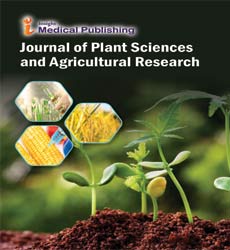Phytomedicine Covers a Wide Spectrum Therapeutic Applications
Kang Milung*
Department of Pharmacy, Catholic University of Health and Allied Sciences, Mwanza, Tanzania
- *Corresponding Author:
- Kang Milung
Department of Pharmacy, Catholic University of Health and Allied Sciences, Mwanza,
Tanzania,
E-mail: Milung_k@cuhas.org
Received date: February 12, 2024, Manuscript No. IPJPSAR-24-18977; Editor assigned date: February 15, 2024, PreQC No. IPJPSAR-24-18977 (PQ); Reviewed date: February 29, 2024, QC No. IPJPSAR-24-18977; Revised date: March 07, 2024, Manuscript No. IPJPSAR-24-18977 (R); Published date: March 14, 2024, DOI: 10.36648/ipjpsar.8.1.131
Citation: Milung K (2024) Phytomedicine Covers a Wide Spectrum Therapeutic Applications. J Plant Sci Agri Res Vol.8 No.1: 131.
Description
Phytomedicine, also known as herbal medicine or phytotherapy, is a branch of medicine that utilizes plant-based remedies for therapeutic purposes. Throughout history, plants have been a fundamental source of medicine for various cultures around the world. The use of plant-derived substances to treat ailments predates recorded history, with evidence of herbal remedies dating back to ancient civilizations such as the Egyptians, Greeks, and Chinese.
Medicinal properties
The practice of phytomedicine is based on the belief that plants contain a wide array of chemical compounds with medicinal properties. These compounds, known as phytochemicals, include alkaloids, flavonoids, terpenes, and many others, each with unique effects on the human body. For example, alkaloids like morphine and quinine have been derived from plants and used to alleviate pain and treat malaria, respectively. One of the key principles of phytomedicine is the concept of holistic healing, which considers not only the physical symptoms of an illness but also the individual's overall wellbeing. This approach aligns with traditional systems of medicine such as Ayurveda and Traditional Chinese Medicine (TCM), which emphasize the importance of restoring balance and harmony within the body. In recent years, there has been a resurgence of interest in phytomedicine, driven by a growing awareness of the limitations and side effects of conventional pharmaceutical drugs. Many people are turning to herbal remedies as a natural and often safer alternative for managing various health conditions. The efficacy of phytomedicine is supported by a wealth of scientific research, which has identified numerous plant compounds with potent medicinal properties. For example, the compound artemisinin, derived from the sweet wormwood plant (Artemisia annua), is highly effective against malaria and is now a key component of malaria treatment regimens worldwide. Moreover, advancements in technology have enabled researchers to better understand the mechanisms of action behind herbal remedies. Through techniques such as chromatography, mass spectrometry, and bioinformatics, scientists can identify and characterize the active ingredients in medicinal plants, leading to the development of standardized herbal extracts with consistent potency and quality. Phytomedicine encompasses a wide range of therapeutic applications, from managing chronic conditions like diabetes and cardiovascular disease to alleviating common ailments such as headaches and digestive disorders. Known for its immune-boosting properties, echinacea is commonly used to prevent and treat the common cold and flu. Used in traditional medicine for centuries, ginseng is believed to improve energy levels, cognitive function, and overall vitality.
The active compound in turmeric, curcumin, has powerful anti-inflammatory and antioxidant effects, making it effective for relieving joint pain and reducing the risk of chronic diseases. This herb is often used to treat mild to moderate depression and anxiety, with studies suggesting that it may be as effective as conventional antidepressants for some individuals. Ginkgo Biloba Ginkgo is believed to enhance cognitive function and memory, making it a popular supplement for older adults experiencing age-related cognitive decline. Despite the growing popularity of phytomedicine, it's important to approach herbal remedies with caution. While many plant-based remedies are safe when used appropriately, some can interact with medications or cause adverse effects in certain individuals. Additionally, the quality and potency of herbal products can vary widely, so it's essential to purchase from reputable sources and consult with a healthcare professional before starting any herbal treatment regimen. In conclusion, phytomedicine represents a rich and diverse tradition of healing that continues to evolve and adapt in the modern world. With a growing body of scientific evidence supporting their efficacy and safety, herbal remedies offer a valuable complement to conventional medicine, providing individuals with natural alternatives for promoting health and well-being.
Open Access Journals
- Aquaculture & Veterinary Science
- Chemistry & Chemical Sciences
- Clinical Sciences
- Engineering
- General Science
- Genetics & Molecular Biology
- Health Care & Nursing
- Immunology & Microbiology
- Materials Science
- Mathematics & Physics
- Medical Sciences
- Neurology & Psychiatry
- Oncology & Cancer Science
- Pharmaceutical Sciences
